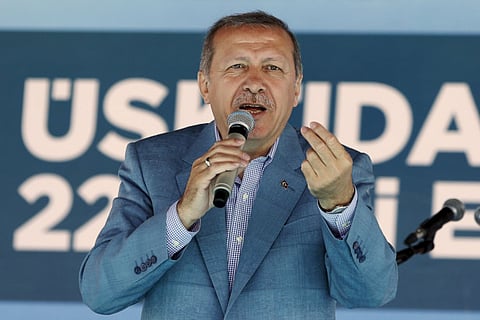General election in Turkey will test Erdogan
AKP may be less forgiving of a plummeting lira and wilful decisions that betray the arrogance of a party and leader too long in power

Turkey’s future is at stake in the general election on June 7. There is little doubt the ruling Justice and Development Party (AKP) will win. The question is whether Recep Tayyip Erdogan, three times prime minister and now President, will get the supermajority through which he plans to subordinate Turkey’s parliamentary system to an executive presidency. But there are signs that Erdogan, who already interferes with any challenge to his growing concentration of power, from the judiciary to the media, may not get his own way.
There has been a whiff of hubris about Erdogan ever since the Gezi park protests broke out across metropolitan and coastal Turkey two years ago against his intrusive, neo-Islamist rule. He still towers over the opposition nationalists and the Kemalist heirs to Mustafa Kemal Ataturk, founder of modern Turkey, who are trapped in the last century. But a new pro-Kurdish coalition, the Peoples’ Democratic party (HDP), which is attracting support from secular Turks, liberals and leftish activists, could spoil the president’s party.
The HDP, led by Selahattin Demirtas, a charismatic former human rights activist, is first of all about winning peace and autonomy for the Kurds of southeast Turkey. It accuses Erdogan of backpedalling after he opened talks with Kurdish insurgents. But by emphasising workers’, women’s and minority rights, the HDP has widened its appeal. When Demirtas told parliament in March “we will never allow you [Mr Erdogan] to become an executive president”, he became the toast of Kemalists as well as the Gezi park communards of 2013.
Rewriting the constitution
Erdogan has discarded any pretence of being the impartial president Turkey’s constitution prescribes. He is pitching for the vote of religious Kurds, stumping the country brandishing an opportunely published Kurdish translation of the Quran. The left-of-centre HDP is countering by mobilising Kurdish tribal networks. There have been ugly incidents, including bomb attacks on HDP premises, and an attempt to tar the Kurdish party as terrorists.
If the HDP fails to win more than 10 per cent of the vote — the high threshold for entry into parliament — the AKP stands to win something like 60 extra seats, and maybe give Erdogan the numbers he needs to rewrite the constitution in his own image.
The incentives for tampering with the June 7 vote are therefore enormous. That is why another activist initiative spawned by the 2013 protests — Oy ve Otesi meaning Vote and Beyond — is deploying a volunteer army of around 120,000 vote monitors to try to make sure no one manufactures Erdogan’s planned apotheosis.
A third reason the president may not get his way is more mundane. Erdogan has a preternatural rapport with the conservative Turks of the Anatolian heartland. But that is in good part because he has brought them prosperity. Now the high growth of the past decade has started to stall, investment is stagnant and unemployment is rising. In response, the Erdogan camp rails against a disembodied “interest rate lobby” conspiring against Turkey. The president even branded Erdem Basci, the central bank governor, a “traitor” for not lowering interest rates.
Abundant easy credit
Turkey’s dilemma is that it is vulnerable to short-term capital flows. Yet, it is not coming to terms with the gradual phase-out of the abundant easy credit of recent years that underpinned its success. The lira has lost about 40 per cent of its value since the Gezi park uprising. Critically, the economic team behind Turkey’s success story is likely to step down after the election. The solipsistic circle of advisers around the president, by contrast, is heavy on conspiracy theorists, some of whose pronouncements are beyond satire. Berat Albayrak, Erdogan’s son-in-law, is spoken of as future economy tsar.
Of his two closest advisers, one has denounced a foreign-inspired plot to kill his boss by telekinesis; while as the lira plumbed new lows against the dollar and euro, the other floated the idea of currency clearing arrangements with Russia and Iran.
The AKP base last year shrugged off compelling evidence of corruption reaching deep into Erdogan’s inner circle and he was elected president. They may be less forgiving of a plummeting lira and wilful decisions that betray the arrogance of a party and leader too long in power. One of the president’s favourite intimidatory ripostes to his critics is to tell them: “Know your limits”. Many millions of Turks — religious as well as secular in a plural society that rejects the suffocating embrace of Erdogan’s paternalism — are hoping these elections will show the president his limits.
— Financial Times


